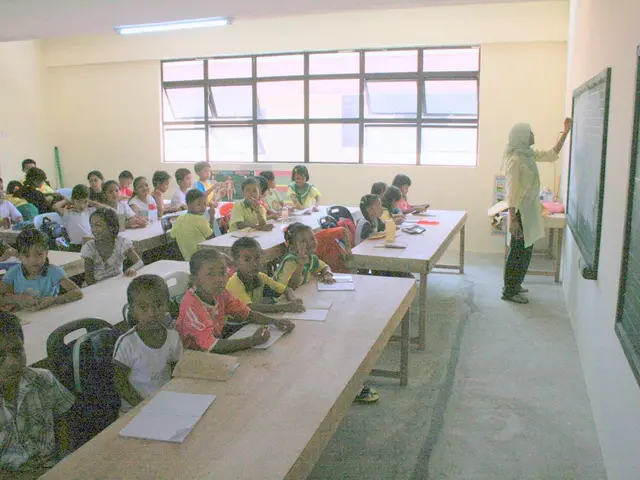Embracing Individual Learning Styles in the Future: Parents-to-be and Neurodiversity
A New Era of Learning: Embracing Neurodiversity
Welcome to an exciting future where our approach to education and parenting is undergoing a profound shift. Neurodiversity, once a fringe concept, is now taking center stage, redefining what it means to learn, grow, and thrive. Here's what the next generation of parents can expect as they navigate this neurodiverse world.
The Evolution of Neurodiversity: From Fringe to Mainstream
Neurodiversity refers to the natural and normal variations in human cognition and brain function. Conditions like ADHD, autism, dyslexia, sensory processing disorder, and even giftedness are part of this rich tapestry of neurological differences. Instead of viewing these differences as deficits, we now see them as diverse ways of thinking and learning.
Just as biodiversity enriches our planet, neurodiversity contributes to the vibrancy of human creativity, empathy, and innovation.
The Tide is Turning: From Fixing to Understanding and Nurturing
Where older generations may have approached neurodivergence with a fixing mentality, future parents will view it as something to be understood, nurtured, and built around.
The Ideal Time for Change: The Perfect Storm of Shifts
Several cultural, scientific, and technological changes are converging to make individualized learning paths more viable and necessary:
- Greater Diagnosis and Awareness: Rising diagnoses of neurodivergent conditions are no longer a sign of their increasing prevalence but rather our improved ability to recognize and support them.
- EdTech Advancements: Adaptive learning platforms are using AI to cater to each child's pace, strengths, and struggles, making these tools more accessible for all learners.
- The Post-Pandemic Lens: Disrupted traditional education highlighted that not every child thrives in a classroom setting. Many parents discovered that their child learns better in flexible, interest-driven environments.
- Cultural Change: The younger generation is more inclusive, aware of mental health, and appreciative of the intersectionality between identity and opportunity.
Parenting the Future Generation: From Diagnosis to Discovery
Future parents will prioritize observation, curiosity, and customization instead of quickly settling on a diagnosis and label.
Redefining Success: A Broader Scope of Achievement
Instead of measuring a child's worth by academic achievements alone, parents will focus on broader definitions of success like creativity, empathy, problem-solving, resilience, and adaptability.
Building Customized Learning Ecosystems
Traditional schooling will take a back seat as future parents introduce hybrid education models, such as:
- Micro-schooling or pod learning with flexible curriculums
- Interest-based learning that allows children to dive deep into their passions
- At-home enrichment using tech platforms and hands-on activities tailored to their child's cognitive profile
Learning will no longer take place solely in classrooms – it will happen in gardens, maker spaces, online communities, and immersive virtual environments.
Tech as a Tool: Enhancing, Not Replacing
AI tutors, cognitive games, and emotion-sensing wearables will be commonplace. However, they won't replace human interaction – they'll enhance it, providing real-time insights that help parents and educators understand and adapt their strategies.
Advocating for Inclusion: A Form of Social Activism
Embracing neurodiversity is more than a parenting decision – it's an act of social advocacy. Future parents will not only raise their own children differently; they'll seek systemic change.
- Inclusive Curriculum: Demanding diverse content in history, literature, and science to represent a wide range of minds and experiences.
- Teacher Training: Advocating for educators to be equipped with neurodiversity-informed pedagogy.
- Policy Reform: Supporting legislation that funds alternative education models and enforces anti-discrimination policies in schools.
Changing the Way We Speak: Language Matters
Language has the power to build up or tear down. Future parents will pay attention to the words they use, choosing to describe a child struggling with executive function as "focused," rather than "lazy," or to see a child who processes social cues differently as "perceptive," rather than "weird."
The Long-Term Impact: A Generation of Confident, Self-Aware Learners
Children raised in a neurodiverse world will enter adulthood with self-awareness, self-advocacy skills, and confidence in their unique learning style. They'll be better equipped to navigate the workforce, relationships, and personal growth without the heavy burden of feeling "less than."
Even more crucial – they will be more compassionate, accepting individuals who see strength in differences.
The Future is Neurodiverse – and That's a Good Thing
Future parents will not mold children into societal norms. Instead, they'll craft individualized ecosystems that unlock potential, fostering learners who are more adaptable, emotionally intelligent, and ready to meet our world's complex challenges.
Neurodiversity is a gift to be embraced, not a problem to be solved. And the parents of tomorrow are poised to receive it.
In the evolving landscape of learning and parenting, future parents will see neurodivergent conditions not as challenges to be fixed, but as diverse ways of thinking and learning to be understood, nurtured, and built around. They will reconstruct their children's learning pathways, drawing upon resources such as micro-schooling, interest-based learning, and technology-driven tools, all tailored to the child's unique cognitive profile. These future parents will not only foster individualided learning, but also advocate for systemic change, pushing for inclusive curriculums, teacher training in neurodiversity-informed pedagogy, and policy reform that supports alternative education models and anti-discrimination policies in schools. By adopting inclusive language and cultivating self-awareness, they will nurture a generation of confident, self-advocating learners who thrive in a neurodiverse world, bringing a unique blend of adaptability, emotional intelligence, and a deep understanding of the power and importance of neurodiversity.








